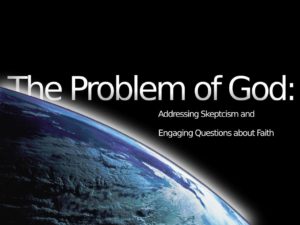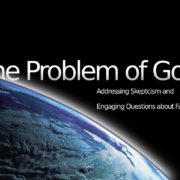Apologetics and Addressing the Problems Presented by Faith
The Problem of God
For the first time in my life as a pastor, I am delving sermon series topic, broadly called Apologetics, that I have always tried to avoid. Apologetics is a discipline within theology that is all about defending the Christian faith. Apologia is a Greek word that means “a defense” or “speaking in defense.”
 I believe in the necessity of Apologetics. I would say that I even understand the basic concepts of defending the Christian faith and I have taken classes on the subject. I just haven’t preached an Apologetics based series.
I believe in the necessity of Apologetics. I would say that I even understand the basic concepts of defending the Christian faith and I have taken classes on the subject. I just haven’t preached an Apologetics based series.
There are a lot of reasons I have avoided doing so. First, doing it well is challenging. One doesn’t want to do a sloppy job of defending God and God’s word. Second, there is a great danger of ending up in conflict with others due to bad methodology, pride, and or debate. Third, It is difficult to break down the concepts into 30-35 minute sermons.
So why is now a good time to talk about these things via a sermon series? Good question. I am glad you asked.
Responding to Doubt, Dilemmas, and Suspicion
I regularly get asked questions about God, the validity of the Bible, evolution, science, and more. Sometimes these questions address a doubt that has arisen in someone’s life. Lately, several of these questions have come when family members, friends, or individuals from church have embraced atheism or agnosticism. It’s essential to respond clearly, articulately, with care, concern, compassion, understanding and knowledge.
Responding to Anti-Faith Writing
Several writers have recently made it big with anti-faith writings that espouse secular humanism and radical atheism as the only reasonable belief systems. They go so far as to argue that one cannot exercise reason and have a faith because the two are the antithesis of the other. I now regularly have conversations with individuals inside and outside of the church who have read these authors and embraced some of their ideas. The titles of their books are extremely provocative and dismissive of faith. Sam Harris wrote a book titled The End of Faith, Richard Dawkins wrote one titled, The God Delusion, Christopher Hitchens wrote one called God is Not Great, and Daniel Dennett wrote a book called Breaking the Spell. Needless to say, these writing have been consumed by millions and millions of people both inside and outside of the church. They are regularly referenced by those who have read them, and inside and outside the halls of education. It’s good to know how to respond to both the writers and readers of these books.
Responding to Biblical and Christian History Illiteracy
Many Christians have only a superficial understanding of Biblical Theology and Christian History. Much of our Christian growth today comes in the form of short thematic Bible Studies or from sermon series’. These have a place in helping us grow however, they don’t often develop a well rounded Biblical Worldview or help us understand big picture views of theology. In addition, Christian History is neglected. Christian history is given to us via the media or from authors like those above who point out the negatives in Christian History. We hear about the inquisition, the crusades, Christian anti-intellectualism, the Salem witchcraft trials, and other stereotypes of Christian History. We don’t hear about the advent of modern education systems, the development of child-labor laws, the abolition of slavery, the development of health care systems, theories on “just warfare”, anti-violence, and more – all of which developed largely out of a Christian worldview. We obviously need to be sorry for past sins, but we also need to celebrate how God has used Christian thought and leadership throughout history.
Transcending Earlier Arguments and or Stereotypes of Christian Thought
Somehow the church needs to move beyond its early arguments against science, evolution, secular humanism, and the like. Certainly, these had a place, but the conversations around these things are way more complex today. New Conversations need to emerge that take these things seriously, take in and respond to new data, and engage other complexities like pluralism, postmodernism, relative truth and other theories that are emerging. It’s not that we haven’t been addressing all of the above, but all of the above is constantly changing and maturing and our conversations need to do the same.
As a pastor, I know that some of this just isn’t the reality that most of us live in. But our kids are living in these things daily. They may not know the terminology or consciously engage in these conversations, but they are a part of their everyday existence via school, the news and other media, friendships, social media, and more. They are more affected than most parents and family members are aware of. The truth is that all of us are more affected by these conversations that we are consciously aware of.
The Way Forward
1 Peter 3:15-16 is in many ways a mandate for all Christian’s living in the complexity of their culture. Peter wrote his readers saying, “15 But in your hearts revere Christ as Lord. Always be prepared to give an answer to everyone who asks you to give the reason for the hope that you have. But do this with gentleness and respect, 16 keeping a clear conscience, so that those who speak maliciously against your good behavior in Christ may be ashamed of their slander.” It’s a good thing to be able to “give a reason for the hope that you have” in Christ. My prayer is that we will be more equipped to do so because we are engaging in these kinds of conversations and studies.
I really want to encourage you to participate in the sermon series. If you miss a week, listen later, by subscribing to our podcast feed, or going to our website and listening to the audio or video. Also remember that we livestream our services on the church website and Facebook each Sunday morning at 9:00 am and 10:30 am.
A few of our small groups are using each week’s message as a launching point for the small group discussions. Each week we will have small group discussion work sheets available in the foyer of the church for deeper discussion. Feel free to take one for your own use or use it to start a small group of your own.



